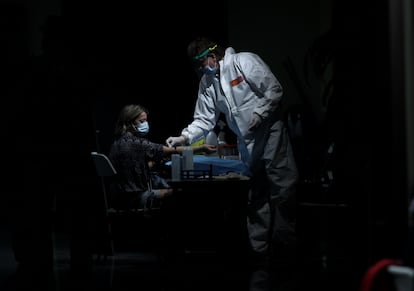One out of every 10 Spaniards may have contracted coronavirus, new study shows
Transmission is speeding up in Catalonia, where authorities might review their Christmas plan in the coming days

Nearly 10% of the Spanish population may have contracted the coronavirus at some point, half of them during the second wave of the pandemic, according to the preliminary results of the fourth wave of a seroprevalence study released on Tuesday.
Results indicate that 9.9% of Spain’s 47 million residents have developed antibodies after exposure to the virus, said the head of the Carlos III Health Institute, Raquel Yotti. The first wave of the study, in May, showed that 5% of the population had developed antibodies; in July that figure had risen slightly to 5.2%.
The director of the National Epidemiology Center, Marina Pollán, noted that during the first wave of the coronavirus in Spain, only one out of every 10 cases were being detected. “Right now, in this second wave of the epidemic, we might be detecting around 60%.”
The study was done between November 16 and 29 at 1,500 healthcare centers, with 51,709 participants, 63% of those who took part in earlier rounds.
The Spanish government is asking citizens not to let their guard down, as the latest data suggests that the recent downward trend in coronavirus infections may have come to an end. The country on Monday reported the first rise in weekend cases in five weeks, and experts have warned that Spain is going into the Christmas holidays with a higher incidence rate than it had at the beginning of summer.
Vaccines in Andalusia

The southern region of Andalusia is planning to start administering the coronavirus vaccine before the end of the year, according to government officials. “The mechanism is in place,” said the Andalusian government spokesperson, Elías Bendodo, at a news conference. Bendodo said that they expect to receive 195,000 doses right after Christmas Eve, and that at-risk workers will be the first with access to them, the regional newspaper Diario Sur reported.
Bendodo also asked the central government for transparency in the way the vaccine is delivered to the regions. The Andalusian leader’s statements suggest that immunizations could begin earlier than originally thought. On Monday, Health Minister Salvador had said that the first doses might arrive in Spain on January 4, and that the Spanish immunization plan “guarantees that all regions will progressively receive” the doses, depending on the speed with which they arrive in Spain.
At the time of Illa’s statements, the European Medicines Agency (EMA) was expected to approve the Covid-19 vaccine from Pfizer and BioNTech by December 29. But the EMA has now decided to bring forward its possible approval to December 21.
Spreading faster in Catalonia
In Catalonia, the transmission speed of the coronavirus has increased notably. The R number, which measures how many people one infected individual will pass the virus to, on average, has risen from 0.91 to 1.11, meaning that for every 100 positive cases, another 111 people will catch the virus. Health authorities consider anything above 1 to represent a danger of exponential spread. Meanwhile, the 14-day incidence rate continues to rise and is now at 211 cases per 100,000 inhabitants, far above the government’s target of 25.
The rising trend could force Catalan authorities to reconsider their Christmas plan, which includes a relaxation of earlier measures. “The figures are telling us there might be a change in the trend. We are assessing them,” said the Catalan government spokesperson, Meritxell Budó, on Tuesday. “We will see if we need to adjust the Christmas plan once we have analyzed the data. We would communicate it as soon as possible.”
In Madrid, regional authorities have been informed by the Health Ministry that it looks favorably on the idea of letting pharmacies administer antigen tests “within the context of population screening in high-incidence areas.” The Madrid government has been pushing for this option for weeks.
English version by Susana Urra.
Tu suscripción se está usando en otro dispositivo
¿Quieres añadir otro usuario a tu suscripción?
Si continúas leyendo en este dispositivo, no se podrá leer en el otro.
FlechaTu suscripción se está usando en otro dispositivo y solo puedes acceder a EL PAÍS desde un dispositivo a la vez.
Si quieres compartir tu cuenta, cambia tu suscripción a la modalidad Premium, así podrás añadir otro usuario. Cada uno accederá con su propia cuenta de email, lo que os permitirá personalizar vuestra experiencia en EL PAÍS.
¿Tienes una suscripción de empresa? Accede aquí para contratar más cuentas.
En el caso de no saber quién está usando tu cuenta, te recomendamos cambiar tu contraseña aquí.
Si decides continuar compartiendo tu cuenta, este mensaje se mostrará en tu dispositivo y en el de la otra persona que está usando tu cuenta de forma indefinida, afectando a tu experiencia de lectura. Puedes consultar aquí los términos y condiciones de la suscripción digital.









































